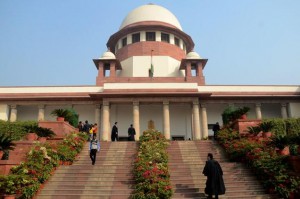Supreme Court :Freedom of speech is not absolute
 NEW DELHI: In a verdict with far-reaching consequences, the Supreme Court on Friday refused to abolish criminal defamation as an offence under the Indian Penal Code (IPC).
NEW DELHI: In a verdict with far-reaching consequences, the Supreme Court on Friday refused to abolish criminal defamation as an offence under the Indian Penal Code (IPC).
Delivering his verdict on a batch petitions filed including by Subramanian Swamy, Arvind Kejriwal and Rahul Gandhi, Justice Dipak Misra said that Article 19(1) of the Constitution that guarantees freedom of speech is not absolute.
The petitioner had questioned the constitutional validity of sections 499 and 500 of the Indian Penal Code providing for criminal defamation. They argued that the criminal defamation under these sections of the IPC travelled beyond constitution’s article 19(2) that imposes reasonable restriction on the freedom of speech and expression.
If you criticise me, it’s freedom of speech, if I do then it’s intolerance: Arun Jaitley to Sitaram YechuryIn his verdict, the learned judge said that the freedom of speech has to be balanced with rights of other individuals as it will curb the right to life guaranteed to them by the Constitution.
The court said that criminal defamation has no ‘chilling effect’ on free speech as argued by the petitioners.During hearing in the case, the Centre had defended the need to have criminal defamation in the IPC.
Attorney Mukul Rohtagi based his arguments on the fact that while in other countries, defamation cases are decided very fast, in India it takes years even decades before they reach a conclusion.
Rohatgi had said that there were sufficient safeguards in article 19(2) which imposed reasonable restrictions of the right to free expression and speech guaranteed under article 19.

